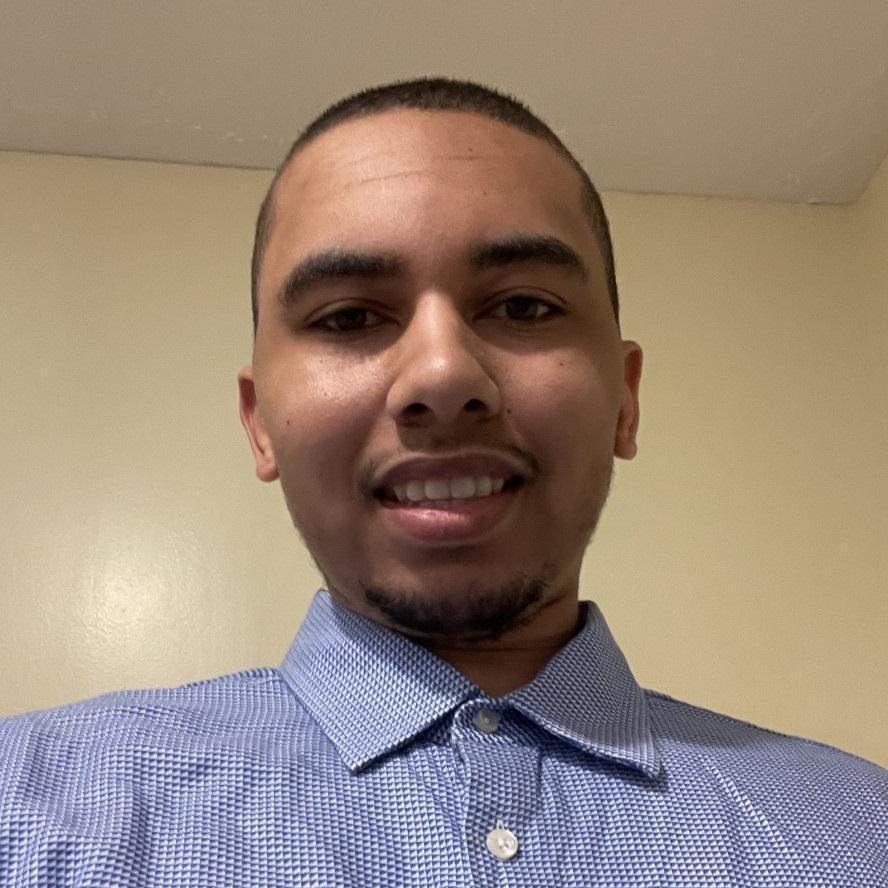
אמקה צ'ימה
Expert in Information Systems and Peer Support Specialist: Emeka Chima
Emeka Chima earned an associate of arts degree from Montgomery College in Germantown, Maryland, in 2020, and in 2022 he received a bachelor’s degree from the University of Maryland Global Campus in the field of Information Systems. At Montgomery College, he was a Dean’s List recipient twice and was inducted into the Phi Theta Kappa Honor Society. He currently works as a peer support specialist for an outpatient mental healthcare clinic for first episode psychosis adolescents and young adults.
Raised by his Nigerian father and his mother from Washington, D.C., Emeka experienced a happy childhood. As the oldest of five, he had the privilege to watch over his younger siblings. In high school, he played soccer and flag football, winning three trophies. His mother is currently a cybersecurity analyst for a Department of Defense contractor. Emeka would also like to work in such a field.
However, about age 15, Emeka began to hear voices. Initially, while in class, the voices would command him to look away in the distance. Gradually, the voices became more powerful, telling him to isolate himself from others, even family members whom he loved.
לילה אחד, הקולות ציוו על אמקה לחתוך את עצמו בסכין. הוא הפך להזוי, והאמין שאם רק יפגע בעצמו, "הכל יהיה בסדר". הוא זוכר שנכנס לפאניקה וצרח כשהניף סכין באוויר. במבט לאחור, אמקה מתקשה לתאר את מחשבותיו באותה תקופה. הוא הרגיש שהוא צריך לברוח.
דודתה של אמקה שמעה אותו צורח והחלימה את המצב, הרגיעה אותו, כשהיא שכנעה אותו להניח את הסכין. לאחר מכן, אמקה חשה אשמה על "אקט אאוט", מבלי לדעת שהוא נאבק עם הופעת מחלת נפש קשה.
A few weeks later, Emeka had a similar experience, brandishing another knife, but this time he was alone. The voices commanded him to keep the knife with him at all times for self-defense. Although the voices sounded like a family member to Emeka, he realized that his family would never want him to harm himself. In the following days, Emeka confided in his father that he was hearing voices and stated that he might need help.
Soon after, during the night, Emeka began hallucinating again. This time, he heard a crowd of people, unexpected visitors who came without immediate warning and seemed closer in his imagination than reality. As the night went on, Emeka heard a voice consoling him and confirming that everything would be okay, as well as another voice telling him to hurt himself.
למחרת בבוקר, כשאביה של אמקה ביקר את אמקה בחדר השינה שלו, הוא חשב שאולי יש לאמקה התקף. סבו מצד אביה של אמקה נאבק במשך שנים רבות בהפרעה דו קוטבית, ואביו חשד שגם אמקה חולה בנפשו. יחד הם פנו לבית החולים.
בזמן שהייתה בבית החולים, אמקה אובחנה כחולה בסכיזופרניה פרנואידית. הוא עדיין היה רק בן 15. למרות ההרס שנאמר לו שיש לו הפרעה במוח, למדה אמקה שניתן להסביר את הסימפטומים שלו על ידי האבחנה שלו, שהעניקה לו הקלה. הוא גם גילה שיש טיפול. לאחר שלושה שבועות במחלקה הפסיכיאטרית הוא השיג יציבות, שוחרר וחזר לבית הספר. הוא עדיין היה זוטר באותה תקופה.
The next year was difficult for Emeka. The first medications he tried left his eyes bloodshot, and he felt like he had a hangover though he never drank alcohol or abused drugs. He did not have a regular doctor and often forgot to take his medication. Over the next year, he was hospitalized four times for breakthrough symptoms, but the hospitalizations resulted in little benefit.
During September of Emeka’s senior year of high school, however, he had a new start when he was accepted into a treatment program called EPIC (Early Psychosis Intervention Clinic) through Johns Hopkins Medicine. Through EPIC, Emeka began a trial of clozapine, a medication for treatment-resistant patients. Within a week, Emeka began to see great improvement. He recalls feeling like his recovery on clozapine was a “miracle.”
On clozapine, Emeka finished high school with high honors, winning awards for every class. He did not know exactly what career he wanted to pursue, but he was confident that he would succeed.
After high school, Emeka completed his information systems degree and has recently received honors towards his bachelor’s degree at the University of Maryland Global Campus. He has also been involved with the nonprofit organization, Students with Psychosis since April 2020 and serves as President on its Executive Board.
Emeka says: “When it comes to young people with brain disorders, I would advise not to hesitate to receive help because there is both a physical and emotional need to be surrounded by people who understand. Working through the recovery process can feel overwhelming, but we can develop the resilience to achieve mental wellness.”

